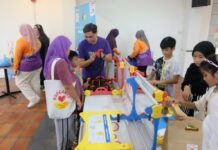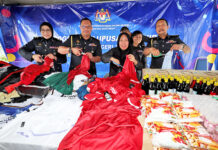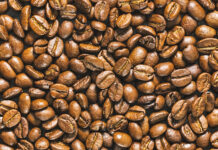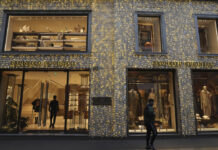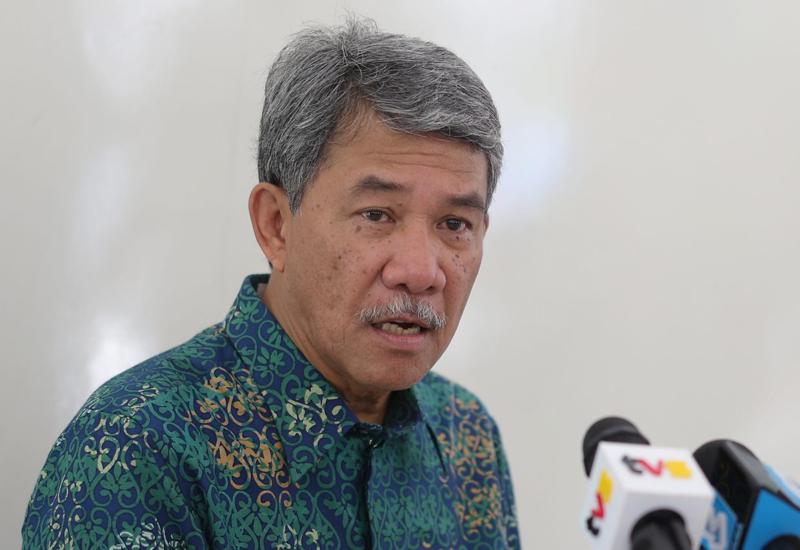Crafting almost 700 loaves a day, an artisan baker in Siem Reap is defying modern trends, opting for a traditional clay oven despite a lifelong disability
PHNOM PENH (ANN/THE PHNOM PENH POST) – In Siem Reap, an artisan baker defies modern norms by baking in a traditional clay oven, showcasing unwavering dedication to this ancient craft amidst a culinary landscape dominated by electric ovens.
Ann Sothea, 54, who is also living with lifelong paralysis in his right leg persistently employs a handcrafted oven despite the modern alternatives available, with customers showing support of the traditional method and the quality of bread it produces.
Sothea, also known as Pu Tbal, a baker residing in Roluos Khang Lech village, Roluos commune, within Siem Reap province’s Prasat Bakong district, explains his unique approach to bread-making.
“In fact, I employ the same bread-making techniques as my peers, but I do so in a traditional wood-burning clay oven.
“My bread oven, meticulously crafted from clay, adheres to the time-honoured method. Nonetheless, the local villagers delight in the delectable and flavoursome nature of my bread,” he states.
His right leg has been paralysed since birth. Before embarking on his journey as an independent bread maker, he worked at a bakery in Siem Reap town.
During this period, he acquired valuable expertise in flour mixing, baking, and various aspects of the bread-making craft.

However, with a monthly salary of only KHR70,000 (USD17.50), he made the pivotal decision to leave his job and establish his own bread-baking enterprise in 1997.
With remarkable resourcefulness, he fashions his oven from locally sourced clay, standing at a substantial 3X3 metres. Its interior boasts pure clay, while the exterior is reinforced with concrete for enhanced longevity.
Exeptional bake
In the pursuit of the perfect bake, Sothea relies on firewood to stoke his oven’s intense heat. Once the flames have burnt to a suitable intensity and the oven attains the desired temperature, he withdraws the spent firewood and readies the oven.
He then loads around 180 loaves of bread into the oven in a single batch.
Sothea’s approach to bread-making knows no rigid timetable. He entrusts his seasoned intuition and senses, frequently opening the oven door to visually gauge the bread’s progress.
When he sees the desired reddish hue, he deems the bread baked to perfection and promptly removes it from the oven. Then he reloads the oven with fresh dough for further baking.
He contends that bread prepared in a clay oven possesses a unique flavour, distinguishing it from bread produced in an electric oven.
“According to my wholesalers, their patrons favour bread baked in a clay oven over that baked in an electric oven.
“They perceive the electric oven-baked bread as less flavoursome. If I were to employ an electric oven, they would simply decline to buy my bread,” Sothea says.
“Customers highlight that during power outages, some bakeries resort to using gas ovens, leading to a lingering gas odour in the bread. In contrast, my clay oven imparts a delightful aroma to the bread,” he explains.
He adds that his daily bread output varies between 600 to 700 loaves, depending on the orders placed by wholesalers. These loaves are distributed and sold in various Siem Reap markets, underscoring the enduring stability in his bread production.
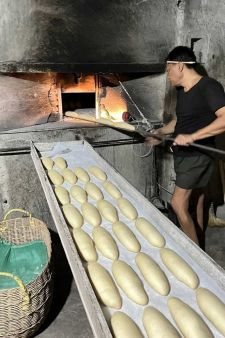
The steady income derived from his bakery sustains not only himself but also his three sons, one of whom is wedded and actively participates in the bread-baking venture.
He says the bread-making operation starts at 6.30pm and continues with the assistance of his son until 3am.
By 4am, wholesalers come to pick up the freshly baked loaves for subsequent resale.
As he sells exclusively to wholesalers, local residents must purchase his bread at the nearby market.
Delectable taste
Ly Va, a longstanding wholesaler who buys bread from Sothea, attests to a fruitful partnership spanning several years. Each day, he orders approximately 200 loaves of bread, pricing each at KHR1,000 (USD0.25).
The unswerving appeal of Sothea’s bread can be attributed to robust market demand.
The distinction lies in the unmatched flavour emanating from Sothea’s clay oven-baked bread when compared to its electric oven-baked counterpart. Local villagers, comprising his customer base, vouch for the bread’s deliciousness.
Va elaborates on the discernible contrast between bread produced in an electric oven and that lovingly baked in a clay oven, emphasising the markedly superior flavour of the latter.
Presently, his procurement of electric oven-baked loaves is limited to approximately 50 units. Conversely, he acquires 200 loaves of clay oven-baked bread, and consistently manages to sell all of them.
“Thanks to the unwavering customer preference and demand, I have been able to sell Pu Tbal’s bread for many years,” he says.
Oum Vong, the chief of Roluos commune, tells The Post that the commune possesses only one clay oven, whereas the prevailing inclination leans towards electric ovens.
He states that some people may hold reservations about clay ovens, potentially associating them with hygiene concerns, and the resulting bread might not exhibit the same visual appeal as electric oven-baked loaves.
Nevertheless, Pu Tbal’s bread undeniably marries both hygiene and delectable taste, defying any such apprehensions.
He adds that Sothea grapples with a paralysed leg, rendering travel a formidable task.
However, his vocation as a traditional baker suits his disability, affording him the means to secure his family’s livelihood and provide for his wife and children.
“The vendors at the Prasat Bakong district market offer Pu Tbal’s bread owing to its exceptional taste. Personally, whenever I attend meetings, I procure approximately 50 loaves for sharing,” remarks the commune chief. – Kim Sarom


